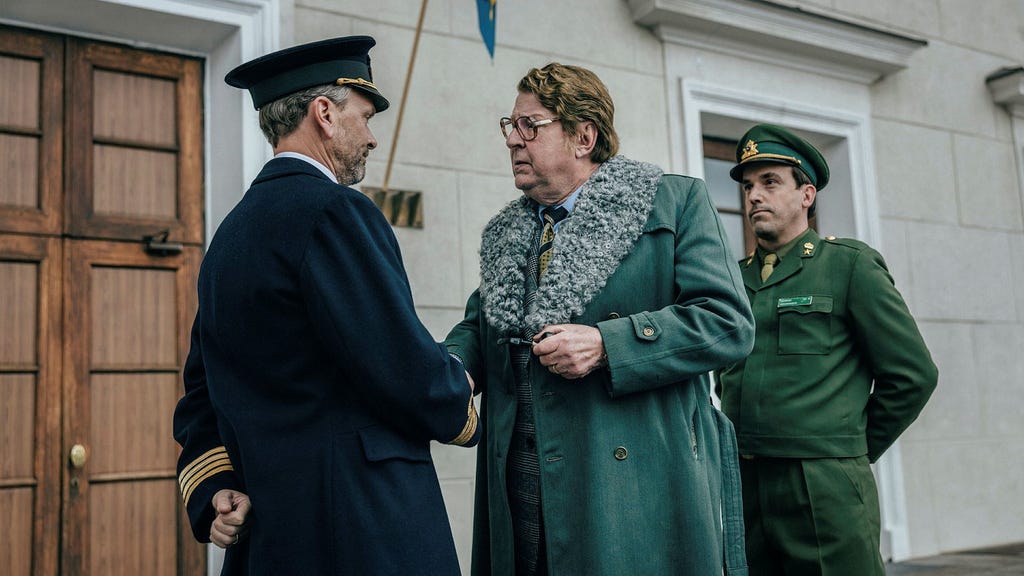The year is 1981. The Cold War casts a long, chilling shadow over the world. In the dark, frigid waters of the Baltic Sea, a Soviet submarine, the U-137, runs aground just outside the Swedish naval base at Karlskrona. This incident, infamously dubbed ”Whiskey on the Rocks,” ignites an international crisis, pushing Sweden and the Soviet Union to the brink of war. The mini-series ”Whiskey on the Rocks,” starring Rolf Lassgård as the then-Swedish Prime Minister Thorbjörn Fälldin, offers a dramatic yet humorous retelling of this tense historical event, exploring the political maneuvering, military posturing, and the underlying fear that gripped the nation. It paints a vivid picture of a nation caught in the crosshairs of superpower rivalry, forced to navigate the treacherous waters of international diplomacy while staring down the barrel of a potential conflict.
The series delves into the heart of the crisis, showcasing the confusion and tension that permeated the Swedish government as they grappled with the unprecedented situation. The sudden appearance of a foreign, nuclear-armed submarine deep within Swedish territorial waters posed a grave threat to national security and sovereignty. Fälldin, a farmer turned politician, is thrust into the international spotlight, forced to make critical decisions with potentially devastating consequences. The series portrays him as a man of quiet strength and resolve, wrestling with the immense pressure of protecting his nation while simultaneously trying to avoid escalating the situation into open warfare. The narrative skillfully portrays the internal debates within the Swedish government, the conflicting advice from military officials, and the constant pressure from both the Soviet Union and the Western powers.
”Whiskey on the Rocks” doesn’t shy away from the absurdity of the situation, injecting humor into the tense narrative. The image of a Soviet submarine, laden with nuclear weapons, stuck on a rock in Swedish waters is inherently ironic. The series uses this irony to its advantage, highlighting the almost comical nature of the incident while simultaneously emphasizing the very real danger it represented. The cultural differences between the stoic Swedes and the seemingly bumbling Soviets are subtly played for laughs, providing a much-needed release valve for the underlying tension. This blend of humor and drama allows the series to explore the complex emotions of the time – fear, uncertainty, and even a touch of bewildered amusement – without trivializing the gravity of the situation.
Beyond the immediate crisis, the series also explores the wider geopolitical context of the Cold War. Sweden, a neutral nation, found itself caught between two superpowers, each vying for dominance. The incident with the U-137 exposed the vulnerability of neutrality in a world divided by ideological conflict. The series depicts the delicate balancing act Fälldin and his government had to perform, striving to maintain their neutrality while simultaneously defending their territorial integrity against a clear violation by the Soviet Union. It highlights the pressure exerted by both the East and the West, each attempting to influence Sweden’s actions and gain an advantage in the ongoing Cold War struggle.
The series further examines the impact of the incident on Swedish society. The grounding of the U-137 shattered the illusion of security and neutrality that many Swedes had cherished. The realization that their country could be a pawn in a larger geopolitical game was a sobering one. ”Whiskey on the Rocks” portrays the anxieties and fears of the Swedish public, capturing the sense of unease that permeated the nation. It also showcases the resilience and determination of the Swedish people in the face of this unprecedented threat. The series depicts how the incident ultimately strengthened Swedish resolve to defend their sovereignty and maintain their neutrality, even in the face of immense pressure.
Through its blend of drama, humor, and historical context, ”Whiskey on the Rocks” provides a compelling and nuanced account of this pivotal moment in Cold War history. It offers a captivating portrayal of Thorbjörn Fälldin’s leadership during a time of national crisis, showcasing his strength, resolve, and unwavering commitment to protecting his country. The series goes beyond a simple recounting of events, delving into the human drama and the political intricacies of the situation. It allows viewers to experience the tension, fear, and absurdity of the time while also gaining a deeper understanding of the Cold War and its impact on a small, neutral nation caught in the crossfire. The series serves as a reminder of the fragility of peace and the importance of diplomacy in navigating the treacherous waters of international relations.














